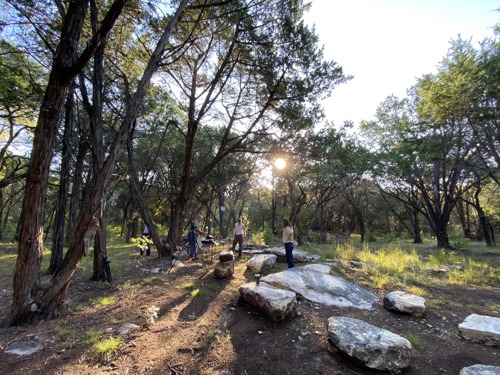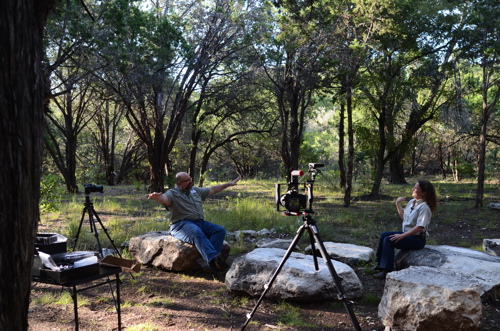

A Virtual Approach to Field-Based Learning
In its best form, education equips others to make the best and most informed decisions—it requires preparation and constant adaptation to the environment and levels of engagement, sometimes in the very moment.
Encompassing a myriad of learning styles, our focused, field-based learning approach facilitates hands-on experiences where natural resource managers and others can observe a demonstration, test what they’ve learned boot-to-boot with specialists and have open discussions on the ground where thoughts flow freely, where gestures of comradery and an appreciation of learning is palpable.
The COVID-19 pandemic created an unprecedented scenario in which learning and transferring knowledge had, nearly overnight, become a virtual experience. In the heart of 2020, there we were, discussing methods of teaching that we had only previously considered marginally as options when the in-person educational opportunities far out-weighed the benefits of screen-to-screen. We were faced with a swiveling pedestal of options and top of mind for us were the ways we were limited to carrying out our mission to share sound science and conservation principles with land and wildlife stewards and students.
Leaning on partners and the expertise of educators, a dedicated team at NRI developed a plan, a sort of napkin-idea approach to test, if you will, to shift to an entirely virtual field-based distance education program called Leopold Live!, a series based on Aldo Leopold’s Five Tools of Wildlife Management, from beginning to end.
The Concept behind Leopold Live
Without a roadmap for something like this in higher education or in existing types of landowner outreach, we anticipated approaching this with a start-stop mentality and, through trial and error, developed a method to provide interactive learning to current and prospective land stewards without students and participants ever entering a classroom or opening a gate. Over the next two years, the series moved far beyond the original tools of axe, cow, plow, fire, and gun, but still aims to meet the challenge of providing a virtual learning experience that is interactive, enjoyable, and informative. From the behind-the-scenes lessons after launching and airing Season 1, the series has evolved and grown into what it is today—a seamless system of coordinated efforts across select platforms, connecting with and teaching several thousand land stewards across the state every month.
The Pilot Series Challenges
Season One of Leopold Live! aired in real time weekly between September 23, 2020, and October 21, 2020 as a truly live experience. The team developed a set up including cameras, wireless transmitters, switchers, internet hotspots, and external batteries to stream multiple camera feeds and their overlaid graphics directly into Facebook Live. During air times, the comment feeds were monitored by experts who were able to answer viewers’ questions as they arose. It took the team approximately 10-12 hours to create each episode, including time for graphic production, travel to the film location, rehearsal on site, equipment set-up, shooting, equipment take down and editing.
Although this is several hours longer than it may take to create a normal classroom lesson, each lesson was recorded during airing and subsequently posted to the NRI YouTube as an invaluable, evergreen resource that can be revisited time and time again. As of February 2023, the videos have been viewed collectively for a total of 460 hours on YouTube alone—the equivalent of hosting about 10 students for 3 hours each week over an entire semester.
Like any new project, the first season of Leopold Live! had its fair share of hiccups as the team worked through a new initiative and setup. The two main challenges were
- ensuring consistent internet connectivity and
- preventing equipment malfunction in the field while on air.
Another topic entirely, it was not a surprise to learn that undeveloped, working land in the middle of the Texas Hill Country does not provide the quickest internet upload speeds. This discrepancy between the available speeds and needed speeds resulted in a loss in video quality and some lagging. A couple of episodes also lacked the necessary audio quality to properly hear what the experts were saying due to random equipment issues that occurred even after testing the equipment and overall lack of experience troubleshooting audio in the field. Working through these challenges allowed the team to better collaborate, organize, and teach about the tools necessary for wildlife management.
The series is now airing every other month and is being prerecorded to allow for more efficient recording and to ensure proper audiovisual quality, but Leopold Live! is still available and “live” as ever and nearing the beginning of Season Three.
Virtually Learning as a Solution
Leopold Live! was originally created as a solution to a problem: how to update traditional education systems in a way that allows an online wildlife habitat resource to mimic a real-life fieldwork experience. Although classes are now able to resume in person, this strategy can still be implemented to reach Texans, students, and land stewards from afar, especially as we consider the ever-growing disconnect to open space land for many.
Students enrolled in the fall 2020 semester of the wildlife habitat management course (WFSC 406/636) at Texas A&M watched along as the episodes aired, and 97.5% responded positively to the experience. The video aspect added to the course helped the students visualize exactly what each management strategy looked like in practice without adding a financial, travel, or time burden to the coursework. The creation of Leopold Live! resulted in an innovative distance education strategy that is far-reaching, accessible to many groups looking for resources, and long-lasting. As the team continues to create videos and in-the-field live resources, they will be able to uniquely connect with new generations of natural resource managers and private landowners.
Women in Science behind Leopold Live!
This month we celebrate internationally women and girls in science, and this year we want to highlight the women who are the brains and backbone of the Leopold Live! project and have been an integral part of creating an innovative method of distance teaching that made wildlife management more accessible to all.
Shelby McCay, a project manager with NRI, is the “showrunner” of the entire Leopold Live! project; she writes, directs, edits, and promotes each episode while assisting in teaching wildlife students at Texas A&M. Dr. April Sansom, the executive director of the Selah, Bamberger Ranch Preserve, has been an incredible partner to NRI by coordinating filming, interviewing guests, and providing expertise as needed. Brittany Wegner, a program manager with NRI, helped create the initial launch, troubleshooted equipment and platforms during pilot filming, organized the team and its resources, and interviewed our presenters. Christina Farrell, a former biologist and ornithologist at Bamberger, provided critical insights on the concept behind and in front of the camera and supported the social media segments from Bamberger. Alison Lund, a program manager at NRI, assisted the film crew during the pilot season to ensure we were working as a team and that our speakers were well prepared to go live. We are proud to work with these women in science and their work is integral to so many of our projects and partnerships.
For a detailed description of the Leopold Live! filming process, read Use of live streaming systems in field-based learning (McCay et al. 2022), featured in the Wildlife Society Bulletin. We would like to especially thank everyone at the Selah, Bamberger Ranch Preserve for generously providing their expertise and land for our use in each episode.



Learn More
Private Land Stewardship Academies
Training land stewardship professionals working with private landowners and educating a community of practice on the importance of science-based conservation. Click Learn More for free access to resources.








